- Home
- Frank Herbert
Whipping Star Page 13
Whipping Star Read online
Page 13
Morning sunshine splashed across the lip of the opening into the Beachball. McKie put a hand into the light, felt the warmth. He knew he should be moving around, making a poor target of himself, but the presence of the watchers made attack unlikely. Besides, he was tired, drugged to alertness and full of the odd emotions induced by angeret. Movement seemed an empty effort. If they wanted to kill him, they were going to do it. Furuneo’s death proved that.
McKie felt a special pang at the thought of Furuneo’s death. There had been something admirable and likable about the planetary agent. It had been a fumbling, pointless death—alone here, trapped. It had not advanced their search for Abnethe, only placed the whole conflict on a new footing of violence. It had shown the uncertainty of a single life—and through that life, the vulnerability of all life.
He felt a self-draining hate for Abnethe then. That madwoman!
He fought down a fit of trembling.
From where he sat McKie could see out across the lava shelf to the rocky palisades and a mossy carpeting of sea growth exposed at the cliff base by the retreating tide.
“Suppose we have it all wrong,” he said, speaking over his shoulder toward the Caleban. “Suppose we really aren’t communicating with each other at all. What if we’ve just been making noises, assuming a communication content which doesn’t exist?”
“I fail of understanding, McKie. The hang doesn’t get me.”
McKie turned slightly. The Caleban was doing something strange with the air around its position. The oval stage he had seen earlier shimmered once more into view, disappeared. A golden halo appeared at one side of the giant spoon, rose up like a smoke ring, crackled electrically, and vanished.
“We’re assuming,” McKie said, “that when you say something to me, I respond with meaningful words directly related to your statement—and that you do the same. This may not be the case at all.”
“Unlikely.”
“So it’s unlikely. What are you doing there?”
“Doing?”
“All that activity around you.”
“Attempt making self visible on your wave.”
“Can you do it?”
“Possible.”
A bell-shaped red glow formed above the spoon, stretched into a straight line, resumed its bell curve, began whirling like a child’s jump rope.
“What see you?” the Caleban asked.
McKie described the whirling red rope.
“Very odd,” the Caleban said. “I flex creativity, and you report visible sensation. You need yet that opening to exterior conditions.”
“The open port? It makes it one helluva lot more comfortable in here.”
“Comfort—concept self fails to understand.”
“Does the opening prevent you from becoming visible?”
“It performs magnetic distraction, no more.”
McKie shrugged. “How much more flogging can you take?”
“Explain much.”
“You’ve left the track again,” McKie said.
“Correct! That forms achievement, McKie.”
“How is it an achievement?”
“Self leaves communicative track, and you achieve awareness of same.”
“All right, that’s an achievement. Where’s Abnethe?”
“Contract . . .”
“. . . prohibits revealing her location,” McKie completed. “Maybe you can tell me, then, is she jumping around or remaining on one planet?”
“That helps you locate her?”
“How in fifty-seven hells do I know?”
“Probability smaller than fifty-seven elements,” the Caleban said. “Abnethe occupies relatively static position on specific planet.”
“But we can’t find any pattern to her attacks on you or where they originate,” McKie said.
“You cannot see connectives,” the Caleban said.
The whirling red rope flickered in and out of existence above the giant spoon. Abruptly, it shifted color to a glowing yellow, vanished.
“You just disappeared,” McKie said.
“Not my person visible,” the Caleban said.
“How’s that?”
“You not seeing person-self.”
“That’s what I said.”
“Not say. Visibility to you not represent sameness of my person. You visible-see effect.”
“I wasn’t seeing you, eh? That was just some effect you created?”
“Correct.”
“I didn’t think it was you. You’re going to be something more shapely. I do notice something though: There are moments when you use our verb tenses better; I even spotted some fairly normal constructions.”
“Self hangs this get me,” the Caleban said.
“Yeh, well . . . maybe you’re not getting the hang of our language, after all.” McKie stood up, stretched, moved closer to the open port, intending to peer out. As he moved, a shimmering silver loop dropped out of the air where he had been. He whirled in time to see it snake back through the small vortal tube of a jumpdoor.
“Abnethe, is that you?” McKie demanded.
There was no answer, and the jumpdoor snapped out of existence.
The enforcers watching from outside rushed to the port. One called, “You all right, McKie?”
McKie waved him to silence, took a raygen from his pocket, held it loosely in his hand. “Fanny Mae,” he said, “are they trying to capture or kill me the way they did with Furuneo?”
“Observe theyness,” the Caleban said. “Furuneo not having existence, observable intentions unknown.”
“Did you see what just happened here?” McKie asked.
“Self contains awareness of S’eye employment, certain activity of employer persons. Activity ceases.”
McKie rubbed his left hand across his neck. He wondered if he could bring the raygen into play quickly enough to cut any snare they might drop over his head. That silver thing dropping into the room had looked suspiciously like a noose.
“Is that how they got Furuneo?” McKie asked. “Did they drop a noose over his neck and pull him into the jumpdoor?”
“Discontinuity removes person of sameness,” the Caleban said.
McKie shrugged, gave it up. That was more or less the answer they got every time they tried to question the Caleban about Furuneo’s death.
Oddly, McKie discovered he was hungry. He wiped perspiration from his jaw and chin, cursed under his breath. There was no real assurance that what he heard in the Caleban’s words represented real communication. Even granting some communication, how could he depend on the Caleban’s interpretations or the Caleban’s honesty? When the damn thing spoke, though, it radiated such a sense of sincerity that disbelief became almost impossible. McKie rubbed his chin, trying to catch an elusive thought. Strange. Here he was, hungry, angry, and afraid. There was no place to run. They had to solve this problem. He knew this for an absolute fact. Imperfect as communication with the Caleban actually was, the warning from the creature could not be ignored. Too many sentients had already died or gone insane.
He shook his head at the fly-buzz of Taprisiot contact. Damn surveillance! This contact, however, failed to break off. It was Siker, the Laclac Director of Discretion. Siker had detected McKie’s disturbed emotions and, instead of breaking contact, had locked in.
“No!” McKie raged. He felt himself stiffen into the mumbling sniggertrance. “No, Siker! Break off!”
“But what’s wrong, McKie?”
“Break off, you idiot, or I’m done for!”
“Well . . . all right, but you felt . . .”
“Break it!”
Siker broke the contact.
Once more aware of his body, McKie found himself danging from a noose which had choked off his breath and was pulling him up into a small jumpdoor. He heard scrambling at the open port. There were shouts, but he couldn’t respond. Fire encircled his neck. His chest burned. Panic filled his mind. He found he had dropped the raygen during the sniggertrance. He was hel
pless. His hands clawed futilely at the noose.
Something grabbed his feet. Added weight tightened the noose.
Abruptly, the lifting force gave way. McKie fell, sprawling in a tangle with whoever had grabbed his feet.
Several things happened at once. Enforcers helped him to his feet. A holoscan held by a Wreave was shoved past his face toward the jumpdoor, which closed with an electric snap. Groping hands and extensors removed the noose from his neck.
McKie inhaled a choking breath, gasped. He would have collapsed without the support of those around him.
Gradually, he became aware that five other sentients had entered the Beachball—two Wreaves, a Laclac, a Pan Spechi, and a human. The human and one of the Wreaves worked over McKie, clearing away the noose and supporting him. The holoscan operator was a Wreave, who was busy examining his instrument. The others were watching the space all around them, raygens ready. At least three sentients were trying to talk at the same time.
“All right!” McKie hushed, shutting off the babble. His throat hurt when he spoke. He grabbed the length of noose from the Wreave’s extensors, examined it. The rope was a silvery material which McKie failed to recognize. It had been cut cleanly with a raygen.
McKie looked at the enforcer with the holoscan, said, “What did you get?”
“The attack was made by an ego-frozen Pan Spechi, ser,” the Wreave enforcer said “I got a good record of his face. We’ll try for ID.”
McKie tossed him the severed length of noose. “Get this thing back to the lab, too. Tell Tuluk to break it down to its basic structure. It may even have some of . . . Furuneo’s cells on it. The rest of you . . .”
“Ser?” It was the Pan Spechi among the enforcers.
“Yes?”
“Ser, we have orders. If an attempt is made on your life, we are to stay with you in here.” He passed a raygen to McKie. “You dropped this, I believe.”
McKie pocketed it with an angry gesture.
Taprisiot contact filled McKie’s mind. “Break it!” he snapped.
But the contact firmed. It was Bildoon in a no-nonsense mood. “What’s going on there, McKie?”
McKie explained.
“There are enforcers around you right now?”
“Yes.”
“Anyone see the attackers?”
“We got a holoscan. It was the ego-frozen Pan Spechi.”
McKie felt the emotional shudder from his Bureau chief. The sensation of horror was followed by a sharp command: “I want you back here at Central immediately.”
“Look,” McKie reasoned. “I’m the best bait we have. They want me dead for some . . .”
“Back, and now!” Bildoon said. “I’ll have you brought in forcibly, if you make that necessary.”
McKie subsided. He’d never before experienced such a black mood from a caller. “What’s wrong?” he asked.
“You’re bait wherever you are, McKie—there or here. If they want you, they’ll come for you. I want you here, where we can surround you with guards.”
“Something’s happened,” McKie said.
“You’re damn right something’s happened! All those bullwhips we were examining have disappeared. The lab is a shambles, and one of Tuluk’s assistants dead—decapitated and . . . no head.”
“Ahhhhh, damn,” McKie said. Then, “I’m on my way.”
All the wisdom of the universe cannot match the alert willingness to dodge a violent blow.
—Ancient folk saying
Cheo sat cross-legged on a bare stretch of floor in the anteroom of his quarters. A sharply defined orange crosslight from windows in the next room stretched his shadow beside him like something lifeless from the night. In his hands he held the length of noose which had remained after it had been cut in the closing of the jumpdoor.
Damnable interference! That big Laclac with the raygen had been fast! And the Wreave with the holoscan had made a record through the jumpdoor—no doubt of that. They’d start hunting back along his trail now, asking questions, showing the holoscan of his face.
Not that it would do them any good.
Cheo’s jeweled eyes glittered with shards of light. He could almost hear the BuSab operatives: “Do you recognize this Pan Spechi?”
The Pan Spechi equivalent of a chuckle, a rumbling grunt, shook him. Fat lot of good that search would do them! No friend or acquaintance from the old days would be likely to recognize his face, now that the medics had changed it. Oh, the bridge of the nose and the set of the eyes were similar, but . . .
Cheo shook his head. Why was he worrying? No one—absolutely no one—was going to stop him from destroying the Caleban! And after that, all these conjectures would be academic.
He sighed heavily. His hands were gripping the length of rope so tightly that his muscles ached. It took him several heartbeats of effort to release them. He climbed to his feet, threw the severed rope at a wall. A flailing end of it lashed a chairdog, which whimpered sibilantly through its atrophied vocal structure.
Cheo nodded to himself. They had to get the guards away from the Caleban or the Caleban away from the guards. He rubbed the scars on his forehead, hesitated. Was that a sound behind him? Slowly he turned, lowered his hand.
Mliss Abnethe stood in the doorway to the outer hall. The orange light created embers in the pearl sheathing of her gown. Her face held back anger, fear, and the grievous murmurings of her psyche.
“How long have you been there?” he asked, trying to keep his voice steady.
“Why?” She stepped into the room, closed the door. “What’ve you been doing?”
“Fishing,” he said.
She swept the room with her insolent gaze, saw the pile of whips in a corner. They were thrown over something vaguely round and hairy. A wet red stain crept onto the floor from beneath the pile. She paled, whispered, “What’s that?”
“Get out of here, Mliss,” he said.
“What’ve you been doing?” she shrieked, whirling on him.
I should tell her, he thought. I should really tell her.
“I’ve been working to save our lives,” he said.
“You’ve killed someone, haven’t you?” she rasped.
“He didn’t suffer,” Cheo said, his voice tired.
“But you . . .”
“What’s one more death among the quadrillions we’re planning?” he asked. By all the devils of Gowachin, she was a tiresome bitch!
“Cheo, I’m afraid.”
Why did she have to whimper like that?
“Calm yourself,” he said. “I’ve a plan to separate the Caleban from her guardians. When we achieve that, we can proceed with her destruction, and the thing’s done.”
She swallowed, said, “She suffers. I know she does.”
“That’s nonsense! You’ve heard her deny it. She doesn’t even know what pain means. No referents!”
“But what if we’re wrong? What if it’s just a misunderstanding?”
He advanced on her, stood glaring over her. “Mliss, do you have any idea how much we’ll suffer if we fail?”
She shuddered. Presently, her voice almost normal, she asked, “What’s your plan?”
One species can, all by itself, produce infinite varieties of experiences. The interaction between many species creates the illusion that infinity has been enlarged by several orders of magnitude.
—The Caleban Question
by Dwel Hartavid
McKie felt danger signals from every nerve ending. He stood with Tuluk in the Wreave’s lab. The place should have been comfortingly familiar, but McKie felt as though the walls had been removed, opening the lab onto boundless space from which attack could come. No matter which way he turned, his back was exposed to menace. Abnethe and her friends were getting desperate. The fact of desperation said she was vulnerable. If only he could understand her vulnerability. Where was she vulnerable? What was her weakness?
And where had she hidden herself?
“This is very strange material
,” Tuluk said, straightening from the bench where he had been examining the silvery rope. “Very strange.”
“What’s strange about it?”
“It cannot exist.”
“But it’s right there.” McKie pointed.
“I can see that, my friend.”
Tuluk extruded a single mandible, scratched thoughtfully at the right lip of his face slit. One orange eye became visible as he turned, glanced at McKie.
“Well?” McKie said.
“The only planet where this material could have been grown ceased to exist several millennia ago,” Tuluk said. “There was only one place—a peculiar combination of chemistry and solar energy . . .”
“You’ve got to be mistaken! The stuff’s right there.”
“The Archer’s Eye,” Tuluk said. “You recall the story of the nova there?”
McKie cocked his head to one side, thought for a moment, then, “I’ve read about it, yes.”
“The planet was called Rap,” Tuluk said. “This is a length of Rapvine.”
“Rapvine.”
“You’ve heard of it?”
“I don’t believe so.”
“Yes, well . . . it’s strange stuff. Has a relatively short life span, among its other peculiar characteristics. Another thing: the ends don’t fray, even when it’s cut. See?” Tuluk plucked several strands from the cut end, released them. They slapped back into position. “It was called intrinsic attraction. There’s been considerable speculation about it. I’m now in a position to . . .”
“Short life,” McKie interrupted. “How short?”
“No more than fifteen or twenty standard years under the most ideal conditions.”
“But the planet . . .”
“Millennia ago, yes.”
McKie shook his head to clear it. His eyes scanned the length of silvery rope suspiciously. “Obviously, somebody found how to grow the stuff someplace other than Rap.”
“Perhaps. But they’ve managed to keep it a secret all this time.”

 Direct Descent
Direct Descent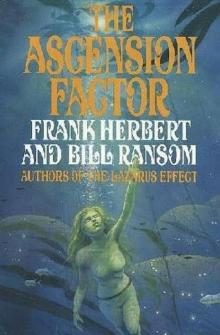 The Ascension Factor
The Ascension Factor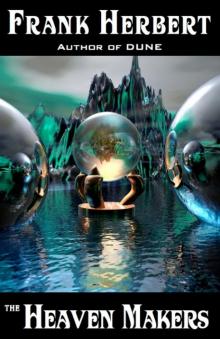 The Heaven Makers
The Heaven Makers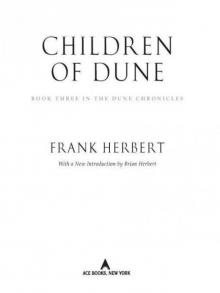 Children of Dune
Children of Dune Old Rambling House
Old Rambling House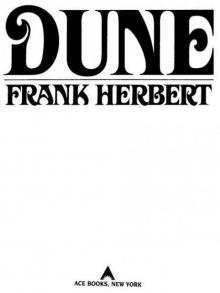 Dune
Dune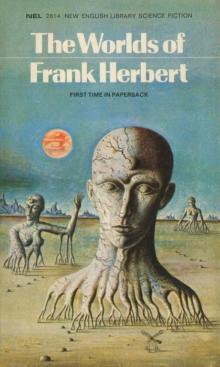 The Worlds of Frank Herbert
The Worlds of Frank Herbert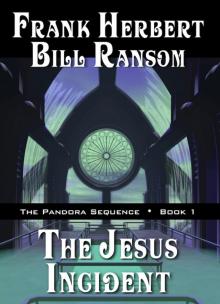 The Jesus Incident
The Jesus Incident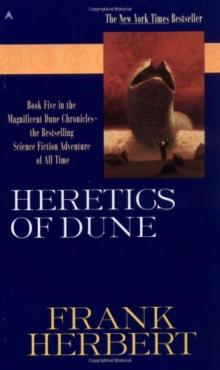 Heretics of Dune
Heretics of Dune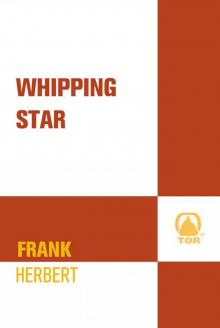 Whipping Star
Whipping Star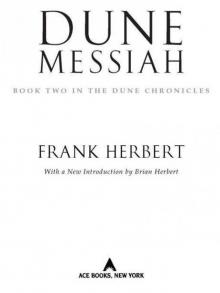 Dune Messiah
Dune Messiah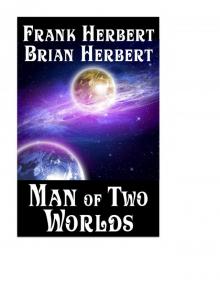 Man of Two Worlds
Man of Two Worlds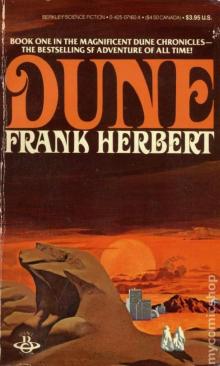 The Book of Frank Herbert
The Book of Frank Herbert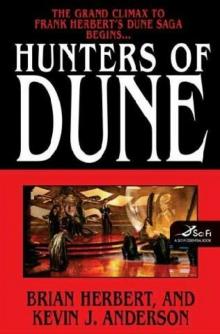 Hunters Of Dune
Hunters Of Dune The Tactful Saboteur
The Tactful Saboteur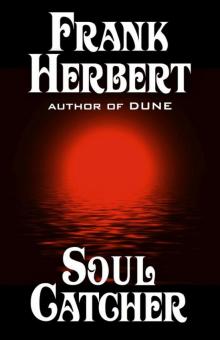 Soul Catcher
Soul Catcher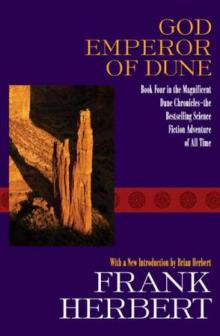 God Emperor of Dune
God Emperor of Dune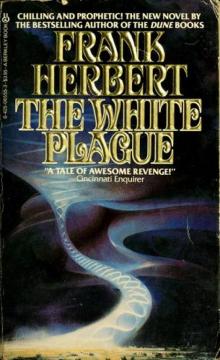 The White Plague
The White Plague The Green Brain
The Green Brain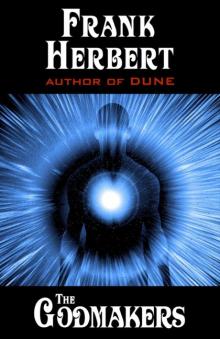 The Godmakers
The Godmakers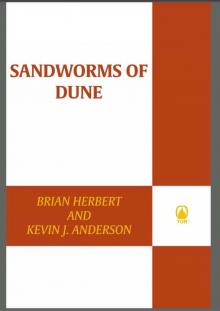 Sandworms of Dune
Sandworms of Dune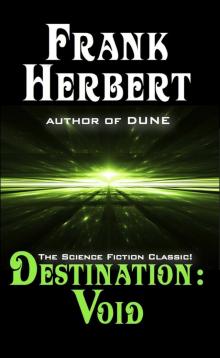 Destination Void
Destination Void The Dosadi Experiment
The Dosadi Experiment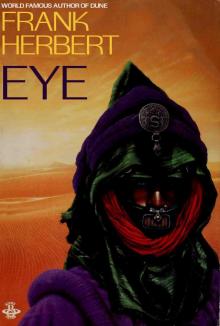 Eye
Eye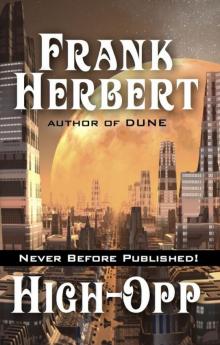 High-Opp
High-Opp The Eyes of Heisenberg
The Eyes of Heisenberg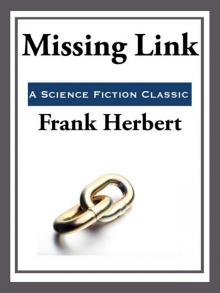 Missing Link
Missing Link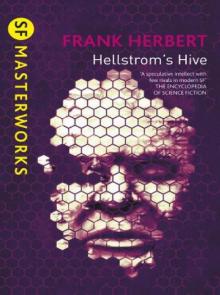 Hellstrom's Hive
Hellstrom's Hive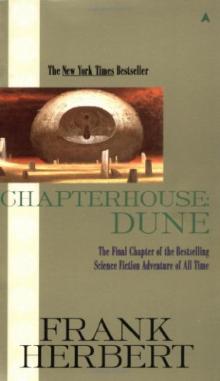 Chapterhouse: Dune
Chapterhouse: Dune The Santaroga Barrier
The Santaroga Barrier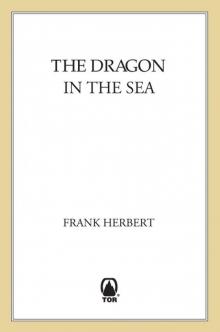 The Dragon in the Sea
The Dragon in the Sea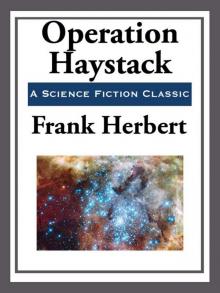 Operation Haystack
Operation Haystack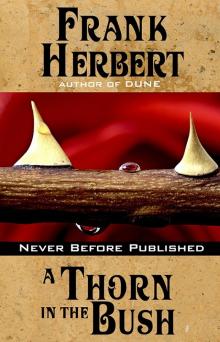 A Thorn in the Bush
A Thorn in the Bush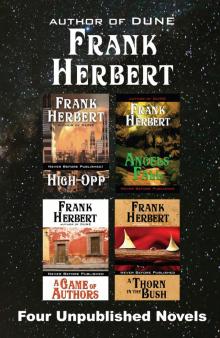 Four Unpublished Novels
Four Unpublished Novels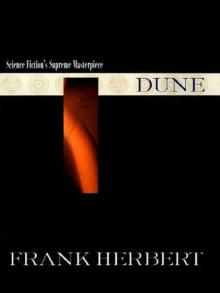 Dune dc-1
Dune dc-1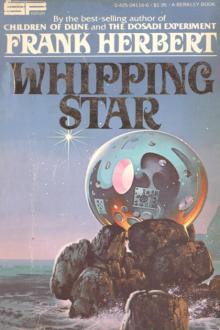 Jorj X. McKie 1 - Whipping Star
Jorj X. McKie 1 - Whipping Star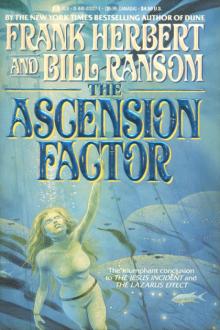 DV 4 - The Ascension Factor
DV 4 - The Ascension Factor Frank Herbert - Dune Book 4 - God Emperor Of Dune
Frank Herbert - Dune Book 4 - God Emperor Of Dune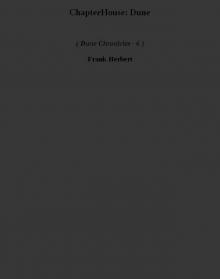 ChapterHouse: Dune dc-6
ChapterHouse: Dune dc-6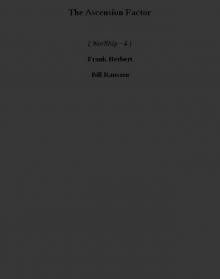 The Ascension Factor w-4
The Ascension Factor w-4 A Game of Authors
A Game of Authors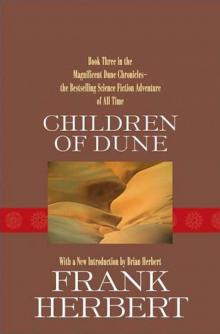 Children of Dune dc-3
Children of Dune dc-3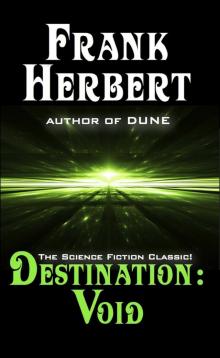 Destination: Void: Prequel to the Pandora Sequence
Destination: Void: Prequel to the Pandora Sequence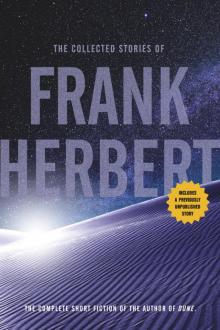 The Collected Stories of Frank Herbert
The Collected Stories of Frank Herbert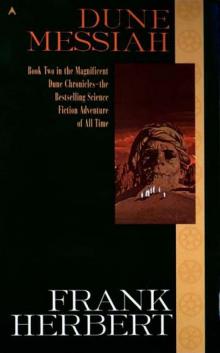 Dune Messiah dc-2
Dune Messiah dc-2 Frank Herbert - Dune Book 5 - Heretics of Dune
Frank Herbert - Dune Book 5 - Heretics of Dune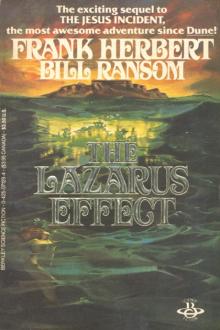 DV 3 - The Lazarus Effect
DV 3 - The Lazarus Effect The Jesus Incident w-2
The Jesus Incident w-2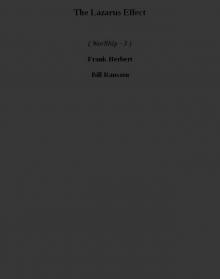 The Lazarus Effect w-3
The Lazarus Effect w-3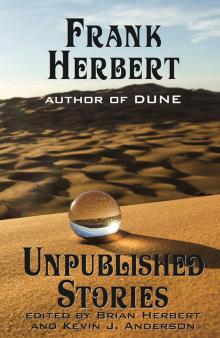 Frank Herbert
Frank Herbert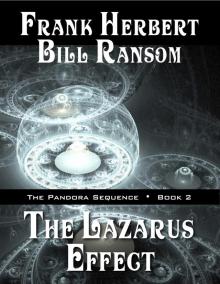 The Ascension Factor: Pandora Sequence
The Ascension Factor: Pandora Sequence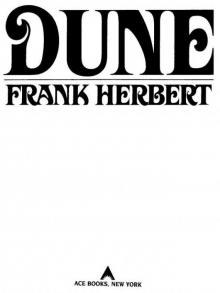 Dune (40th Anniversary Edition)
Dune (40th Anniversary Edition)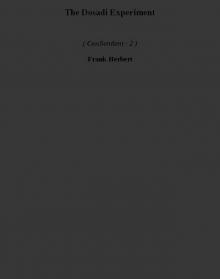 The Dosadi Experiment c-2
The Dosadi Experiment c-2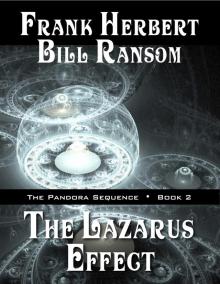 The Lazarus Effect
The Lazarus Effect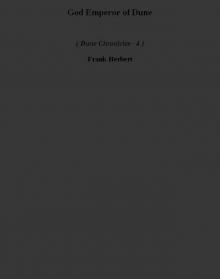 God Emperor of Dune dc-4
God Emperor of Dune dc-4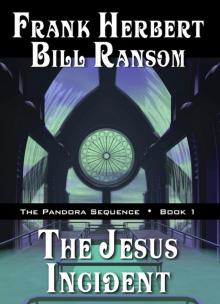 The Pandora Sequence: The Jesus Incident, the Lazarus Effect, the Ascension Factor
The Pandora Sequence: The Jesus Incident, the Lazarus Effect, the Ascension Factor The Green Brain (v4.0)
The Green Brain (v4.0) The Heaven Makers (v4.0)
The Heaven Makers (v4.0)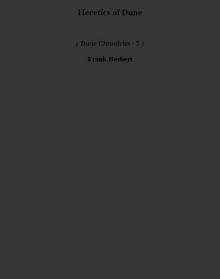 Heretics of Dune dc-5
Heretics of Dune dc-5